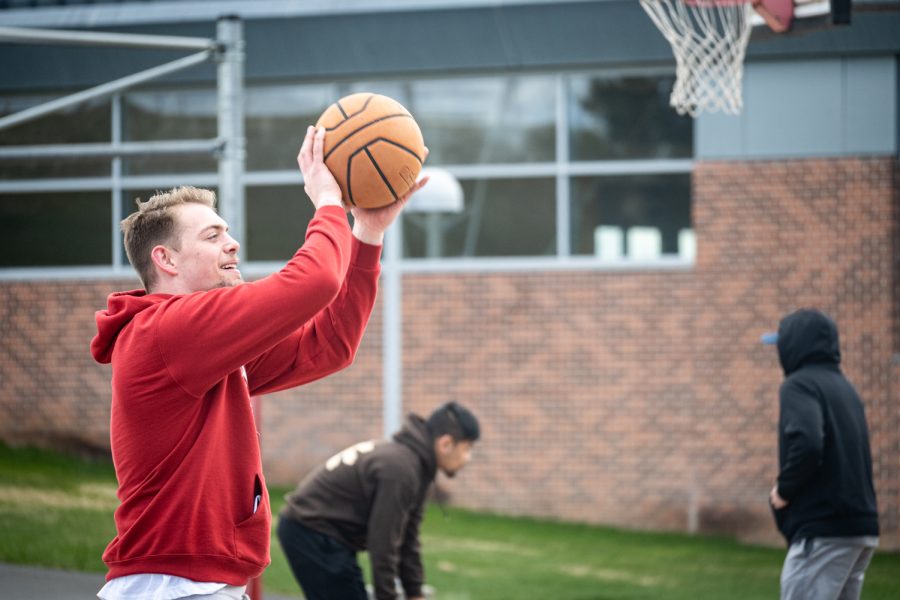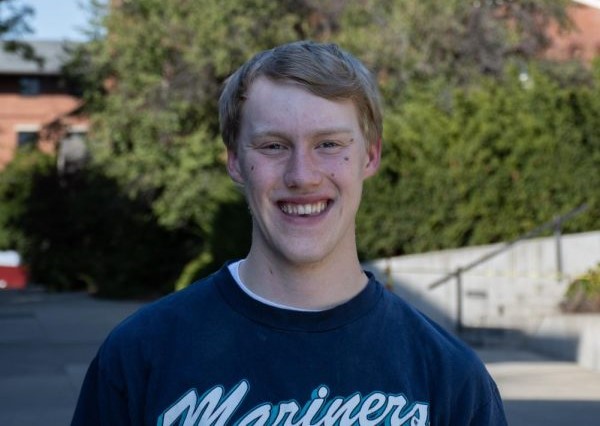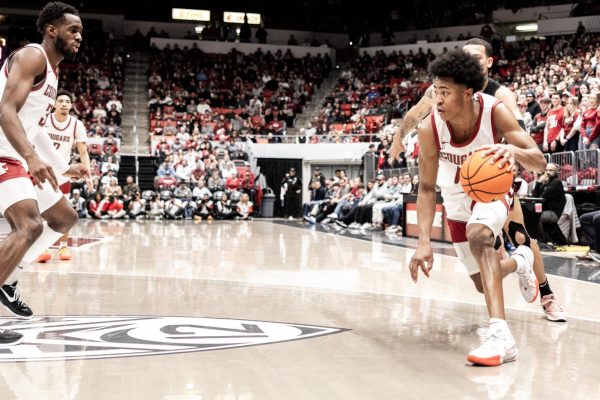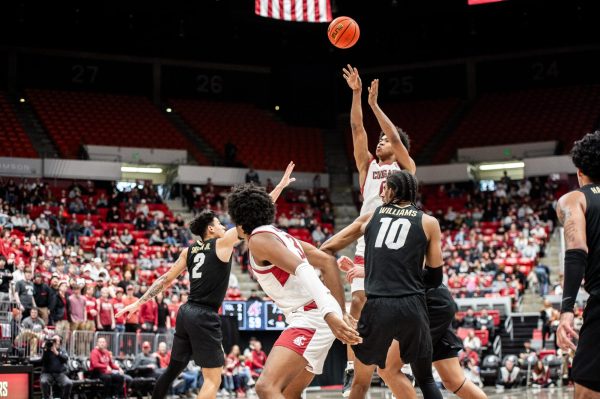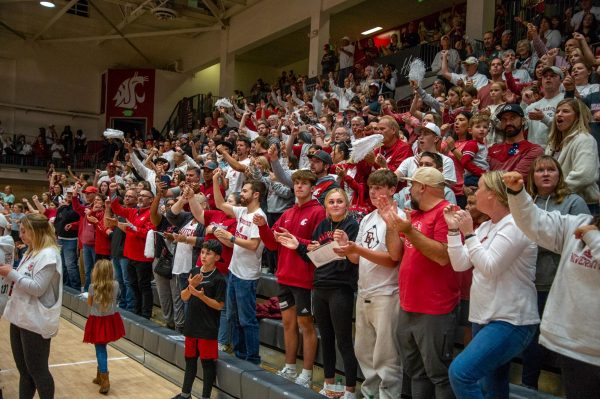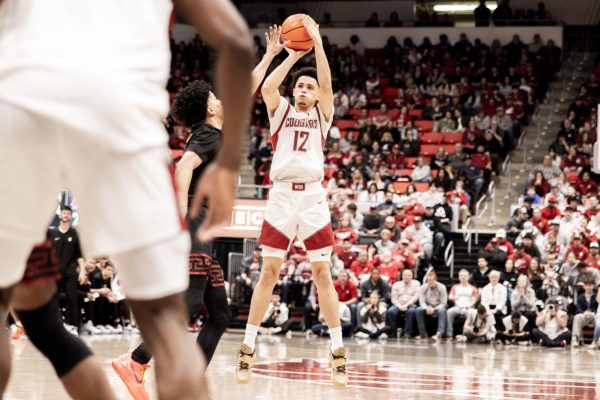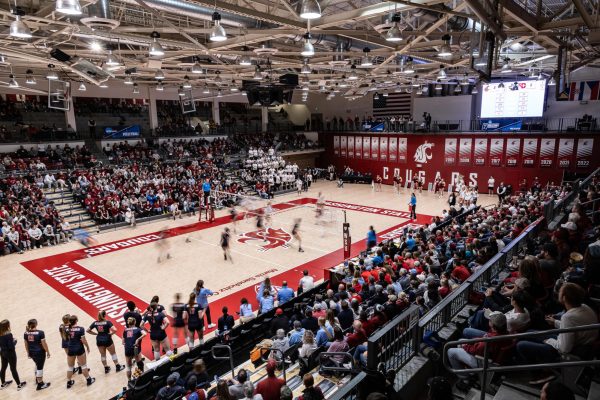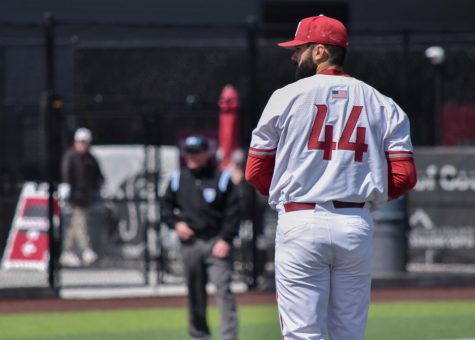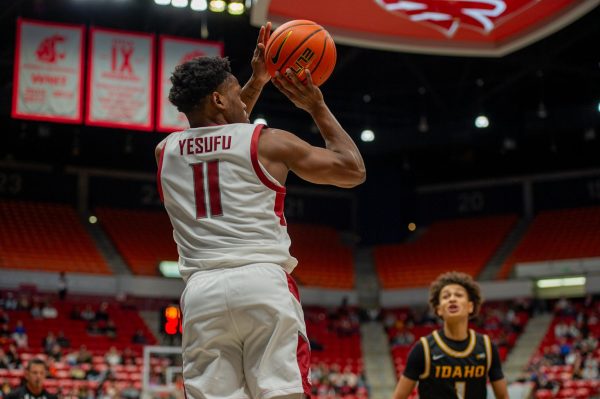Threes for 3 illuminated Student-athlete mental health
Threes for 3 raised over $700 for Hilinski’s Hope
Vaughn Drewien shoots a basketball at the Threes for 3 chariety event for Hilinski’s Hope on April 9, 2022. Drewien planned the event along with six other Sports Managment seniors in April.
September 29, 2022
Trigger warning: This article contains discussions of and references to suicide.
In September 2017, WSU quarterback Tyler Hilinski was on top of the world. The Cougs had just overcome a 21-point 4th quarter deficit against the visiting Boise State Broncos to win 47-44 in triple overtime.
The opportunity that every player strives for was presented to Tyler and he thrived, throwing three touchdowns including the walk-off winner.
Fans rushed the field and Tyler was carried on the shoulders of Cougar nation.
Four months later on Jan. 16, 2018, Tyler died from suicide.
In the wake of Tyler’s death, his parents, Mark and Kym Hilinski founded Hilinski’s Hope foundation. An organization committed to student-athlete mental health.
Hilinksi’s Hope aims to “educate, advocate and eliminate the stigma associated with mental illness.”
In April, seven sports management seniors chose Hilinski’s Hope as the beneficiary of their capstone project for Sports Management 489.
Among that group was Ula Motuga, a member of WSU’s women’s basketball team.
The group consisted of Motuga, Vaughn Drewien, Jack Weigand, Ryan Wolf, Nicholas Patrick, Mason Havey and Luke Hansen.
Athlete mental health is a topic that is becoming increasingly visible but not nearly visible enough, Motuga said.
“I think it is so important purely because it’s just so real. People don’t completely understand. I guess the day-to-day grind is what it takes to be a student-athlete and how much of a toll it can take on you mentally, rather than physically,” Motuga said. “I think fans only ever see the physical things we can do on a court but never really see what it’s like behind closed doors.”
The group hosted a three-point contest called Threes for 3. Throughout his childhood and at WSU, Tyler wore the number three when he played sports and the number three is the symbol of Hilinski’s Hope.
The event was hosted on the outdoor basketball courts of the University Recreation Center rather than indoors because of WSU Recreation rules concerning paid events, Drewien said.
Despite the 40-degree temperatures, a consistent stream of people stopped by to shoot hoops. Once people were suitably warmed up, they were given 25 shots to make a three. Scores were tracked by the students and at the end of the day, the people who made the most shots were given prizes such as gift cards to local restaurants.
The event was also equipped with Hilinski’s Hope swag provided by the Foundation including shirts with the number three on the front and the foundation’s logo on the back. Black, blue and crimson Hilinski’s Hope wristbands were also popular.
As part of the assignment, they secured several sponsors for the event. The Retreat at Pullman agreed to sponsor the event after Drewien, a resident of the complex, asked them to, Motuga said.
The event was also sponsored by Airway Heights and WSU Athletics Marketing.
Motuga’s leadership among her basketball teammates meant that Threes for 3 was a star-studded affair. At least seven members of the team showed up including Bella Murekatete, Jessica Clarke, and the Leger-Walker sisters Krystal and Charlisse.
“I think a lot of times, mental health is overlooked like not just student-athletes like everyone, right,” Clarke said. “But it’s important that we kind of raise awareness for it whenever we can. And for whoever we can.”
Threes for 3 raised a total of $774.81, Drewien said.
The planning team received a lot of support from those closest to them. Drew Harvey’s brother, Mason Harvey helped plan the project and Drew showed up to support.
“I went 10 for 25 So not too bad. Not too bad. It’s been a while since I’ve shot, I’m a little rusty,” Drew said.
Threes for 3 reflected a larger trend of talking about mental health in relation to sports.
“At least talking about mental health and sports and stuff has started to come up a lot more,” Drew said.
Toward the end of the event, a special guest arrived: Kamie Ethridge, WSU women’s basketball head coach.
Ethridge did not attempt any three-pointers, but she did visit with Motuga and some of her other players in attendance before leaving a generous donation.
Under Ethridge’s vision and Motuga’s leadership, WSU women’s basketball has grown to be collaborative on and off the court and an event like Threes for 3 clearly exemplified this. While there is still much to be done, honoring Tyler’s story by creating team environments where student-athletes feel supported and never alone is a step in the right direction.
“[WSU women’s basketball] just focuses on supporting each other and being there for each other more than anything else,” Motuga said.

